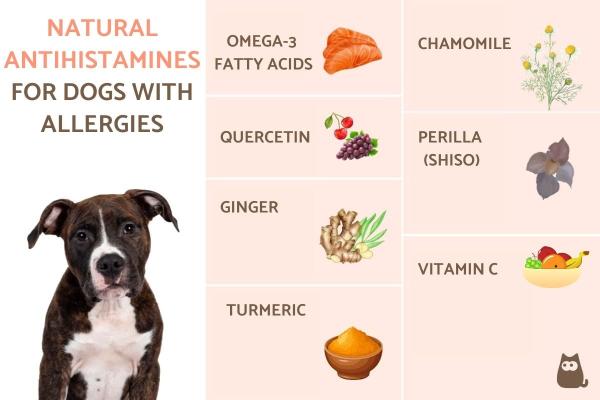Natural Antihistamines for Dogs with Allergies



See files for Dogs
Does your dog suffer from itchy skin, watery eyes, or constant sneezing? These could be signs of allergies! Antihistamines are medications commonly used to combat these symptoms by blocking histamine, the chemical released during an allergic reaction. While traditional antihistamines are effective, some pet owners prefer natural alternatives.
This AnimalWised article explores 7 safe and natural antihistamines for dogs. We'll explain how allergies work, the role of histamine, and how natural ingredients can help manage your dog's discomfort. From calming skin irritation to reducing seasonal sniffles, discover how natural antihistamines can bring relief to your beloved dog.
Omega-3 fatty acids
Fatty acids are essential components of a dog's skin barrier, playing a crucial role in moisture retention and protection against environmental irritants. They also contribute to a healthy coat appearance.
Research suggests that omega-3 fatty acids, specifically EPA and DHA, possess anti-inflammatory properties. These properties may help alleviate itching and improve overall skin health in dogs suffering from allergies. Omega-3 fatty acids are believed to work by reducing the body's inflammatory response to allergens, potentially leading to less redness and irritation.
A dog's regular diet may contain some level of fatty acids. However, for dogs with allergies, additional supplementation may be beneficial. Fish oil is a rich source of omega-3 fatty acids and is a common dietary supplement for dogs with skin allergies.
While fish oil is a popular choice, other supplements containing specific oils may also offer benefits:
- Coconut oil: studies indicate that medium-chain triglycerides found in coconut oil may improve skin health and reduce inflammation.
- Almond oil: this oil provides essential fatty acids and vitamins that can nourish the skin and coat.
It's important to note that rosemary oil, while possessing potential antioxidant properties and benefits for skin health, should be used with caution due to its potency.

Quercetin
Quercetin is a compound from the bioflavonoid group characterized by a greenish-yellow pigment of natural origin. It is found in various fruits and vegetables, including:
- Apples
- Citrus fruits
- Onions
- Cherries
- Grapes
- Blueberries
- Cabbage
Quercetin is effectively used to control allergies and reduce inflammatory processes. It helps manage symptoms such as tearing, runny nose, sneezing, and swelling by stabilizing mast cells, thereby preventing them from releasing large amounts of histamine.
Additionally, quercetin prevents the oxidation of fatty acids that can deteriorate cell membranes and increases the production of glutathione, a powerful antioxidant in the body. This action helps balance the permeability of the intestinal mucosa, controlling the passage of allergens into the blood, and is therefore considered a beneficial home remedy for allergies in dogs.
Dive deeper into safe and effective allergy medications for dogs in our follow-up article.
Ginger
Ginger, a plant known for its horizontal rhizome, is valued for its spicy flavor and aroma. It is also used to alleviate allergy symptoms in dogs due to its natural anti-inflammatory properties, making it an effective natural antihistamine. Ginger can help control symptoms such as runny nose, cough, congestion, asthma, and bronchitis.
Ginger contains gingerols, which exhibit anti-inflammatory effects. Since allergies involve inflammatory responses, ginger might help reduce inflammation associated with allergies, potentially leading to less itching and discomfort.
This antihistamine property is achieved by inhibiting the release of histamine and stimulating the immune system. However, it is always recommended to consult with a veterinarian before administering any natural remedies to ensure they are safe and appropriate for your pet.
Mast cells are involved in the allergic response, releasing histamine (a key allergy mediator) when triggered by allergens. Some studies suggest ginger may help stabilize mast cells, potentially reducing the amount of histamine released in response to allergens.
Ginger is generally safe for most dogs in small quantities, but some may be sensitive. Avoid giving ginger to pregnant or lactating dogs, and consult your veterinarian if your dog has any underlying health conditions.
Turmeric
Turmeric, a vibrant yellow spice from the ginger family, holds promise for dogs suffering from allergies. Its key ingredient, curcumin, boasts powerful anti-inflammatory properties. Curcumin works by inhibiting the production of inflammatory molecules called prostaglandins, which contribute to allergic reactions.
But curcumin's potential goes beyond just reducing inflammation. Studies suggest it might also help regulate the immune system's response to allergens. This could lead to a decrease in histamine production, a key player in allergy symptoms like itching, swelling, and discomfort.
While turmeric offers exciting possibilities as a natural antihistamine and anti-inflammatory for dogs with allergies and joint pain, it's crucial to consult a veterinarian before introducing any supplements to your pet's diet. A veterinarian can assess your dog's specific needs and determine the appropriate dosage to ensure safety and avoid potential interactions with medications your dog might already be taking.
Looking for a holistic approach to managing your dog's allergies? We delve into homeopathy as a potential solution in another article.
Chamomile
Chamomile, also known as camomile, refers to plants resembling daisies from the Asteraceae family, with Matricaria chamomilla and Anthemis nobilis being the most commonly used species.
These plants are renowned for their numerous health benefits, particularly their antispasmodic, antihistamine, and anti-inflammatory properties. These properties make chamomile highly effective in alleviating symptoms in allergic dogs, such as itching and inflammation.
Chamomile's potential benefits for dogs extend beyond allergies. It's known for its calming properties and might be helpful for anxious or stressed dogs. Additionally, it can soothe mild skin irritation.
Perilla
Perilla, also known in Asia by its Japanese name Shiso, is a plant rich in beneficial compounds such as flavonoids, luteolin, apigenin, polyphenols, L-menthol, alpha-pinene, elemicin, and linalool.
It is particularly noted for its high content of rosmarinic acid, which has been proven effective in suppressing allergic immune responses. This makes Perilla an excellent natural antihistamine for dogs.
Perilla is a good source of omega-3 fatty acids, known for their anti-inflammatory effects. Allergies involve inflammatory responses, so theoretically, Perilla could potentially reduce inflammation associated with allergies in dogs, leading to some relief.
Vitamin C
One of the essential vitamins that dogs cannot synthesize on their own is vitamin C. This water-soluble vitamin is crucial for tissue repair and growth, collagen synthesis, wound healing, and scar tissue formation.
Vitamin C is also a potent antioxidant, helping combat free radicals that can contribute to inflammation. Allergies involve inflammatory responses, so Vitamin C's antioxidant effects could potentially offer some relief by reducing inflammation associated with allergies.
Vitamin C plays a role in supporting the immune system. While it doesn't directly target allergies, a healthy immune system might be better equipped to handle allergens, potentially leading to less severe reactions.
Beyond these roles, vitamin C has the ability to degrade histamine and lower its plasma levels. This property makes it an effective natural antihistamine for dogs, contributing to the management of allergic reactions and overall well-being.

If you want to read similar articles to Natural Antihistamines for Dogs with Allergies, we recommend you visit our Basic care category.







